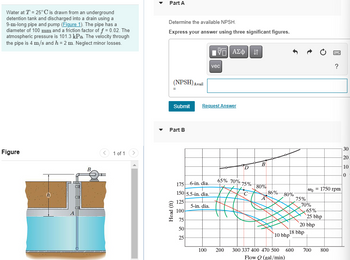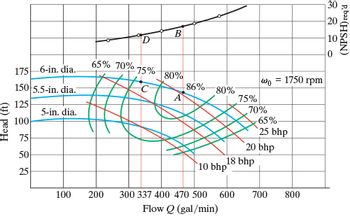
Structural Analysis
6th Edition
ISBN: 9781337630931
Author: KASSIMALI, Aslam.
Publisher: Cengage,
expand_more
expand_more
format_list_bulleted
Concept explainers
Question
thumb_up100%
Water at T� = 25∘C∘C is drawn from an underground detention tank and discharged into a drain using a 9-mm-long pipe and pump (Figure 1). The pipe has a diameter of 100 mmmm and a friction factor of f� = 0.02. The atmospheric pressure is 101.3 kPakPa. The velocity through the pipe is 4 m/sm/s and hℎ = 2 mm. Neglect minor losses.
Determine the available NPSH.
Express your answer using three significant figures.
Determine the required NPSH. Use the pump performance curves shown above.
Express your answer using two significant figures.

Transcribed Image Text:Water at T = 25°C is drawn from an underground
detention tank and discharged into a drain using a
9-m-long pipe and pump (Figure 1). The pipe has a
diameter of 100 mm and a friction factor of f = 0.02. The
atmospheric pressure is 101.3 kPa. The velocity through
the pipe is 4 m/s and h =2 m. Neglect minor losses.
Figure
B
1 of 1
Part A
Determine the available NPSH.
Express your answer using three significant figures.
(NPSH) Avail
Submit
Part B
Head (ft)
175 6-in. dia..
150 5.5-in. dia.
125
5-in. dia.
100
75
50
25
15. ΑΣΦ | 11
Request Answer
100
vec
65% 70%
D
in 10
-75%
B
80%
A
-86%- 80%
10 bhp
75%
18 bhp
200 300 337 400 470 500 600
Flow Q(gal/min)
Wo
70%
-65%-
25 bhp
20 bhp
= 1750 rpm
?
700 800
30
20
10
0
Expert Solution
This question has been solved!
Explore an expertly crafted, step-by-step solution for a thorough understanding of key concepts.
This is a popular solution
Trending nowThis is a popular solution!
Step by stepSolved in 3 steps with 3 images

Follow-up Questions
Read through expert solutions to related follow-up questions below.
Follow-up Question
Determine the required NPSH. Use the pump performance curves shown above.
Express your answer using two significant figures.

Transcribed Image Text:Head (ft)
175 6-in. dia..
150 5.5-in. dia.
125
5-in. dia.
100
75
50
25
100
65% 70%
200
D
5 10
75%
cal
B
80%
-86%
80%
75%
10 bhp
wo = 1750 rpm
70%
18 bhp
65%
25 bhp
20 bhp
300 337 400 470 500 600 700
Flow Q(gal/min)
800
(NPSH) req'd
Solution
by Bartleby Expert
Follow-up Questions
Read through expert solutions to related follow-up questions below.
Follow-up Question
Determine the required NPSH. Use the pump performance curves shown above.
Express your answer using two significant figures.

Transcribed Image Text:Head (ft)
175 6-in. dia..
150 5.5-in. dia.
125
5-in. dia.
100
75
50
25
100
65% 70%
200
D
5 10
75%
cal
B
80%
-86%
80%
75%
10 bhp
wo = 1750 rpm
70%
18 bhp
65%
25 bhp
20 bhp
300 337 400 470 500 600 700
Flow Q(gal/min)
800
(NPSH) req'd
Solution
by Bartleby Expert
Knowledge Booster
Learn more about
Need a deep-dive on the concept behind this application? Look no further. Learn more about this topic, civil-engineering and related others by exploring similar questions and additional content below.Similar questions
- SHOW SOlution Ans. F= 733.16kN 1.844m from the bottom of the tank parallel to the gatearrow_forwardTheflowrateofwaterthroughacastironpipeis5000GPM.The diameter of the pipe is 330mm, and the coefficient of friction is f=0.0173. What is the pressure drop over a 30m length of pipearrow_forwarding Example: Pressure gage B is to measure the pressure at point A in a water flow. If the pressure at B is 9 t'm2 , estimate the pressure at A. ywater - 10 KN/m', yHg = 133.7 KN/m, yoil- 9 KN/m³ plution oil Scm It cmarrow_forward
Recommended textbooks for you

 Structural Analysis (10th Edition)Civil EngineeringISBN:9780134610672Author:Russell C. HibbelerPublisher:PEARSON
Structural Analysis (10th Edition)Civil EngineeringISBN:9780134610672Author:Russell C. HibbelerPublisher:PEARSON Principles of Foundation Engineering (MindTap Cou...Civil EngineeringISBN:9781337705028Author:Braja M. Das, Nagaratnam SivakuganPublisher:Cengage Learning
Principles of Foundation Engineering (MindTap Cou...Civil EngineeringISBN:9781337705028Author:Braja M. Das, Nagaratnam SivakuganPublisher:Cengage Learning Fundamentals of Structural AnalysisCivil EngineeringISBN:9780073398006Author:Kenneth M. Leet Emeritus, Chia-Ming Uang, Joel LanningPublisher:McGraw-Hill Education
Fundamentals of Structural AnalysisCivil EngineeringISBN:9780073398006Author:Kenneth M. Leet Emeritus, Chia-Ming Uang, Joel LanningPublisher:McGraw-Hill Education
 Traffic and Highway EngineeringCivil EngineeringISBN:9781305156241Author:Garber, Nicholas J.Publisher:Cengage Learning
Traffic and Highway EngineeringCivil EngineeringISBN:9781305156241Author:Garber, Nicholas J.Publisher:Cengage Learning


Structural Analysis (10th Edition)
Civil Engineering
ISBN:9780134610672
Author:Russell C. Hibbeler
Publisher:PEARSON

Principles of Foundation Engineering (MindTap Cou...
Civil Engineering
ISBN:9781337705028
Author:Braja M. Das, Nagaratnam Sivakugan
Publisher:Cengage Learning

Fundamentals of Structural Analysis
Civil Engineering
ISBN:9780073398006
Author:Kenneth M. Leet Emeritus, Chia-Ming Uang, Joel Lanning
Publisher:McGraw-Hill Education


Traffic and Highway Engineering
Civil Engineering
ISBN:9781305156241
Author:Garber, Nicholas J.
Publisher:Cengage Learning